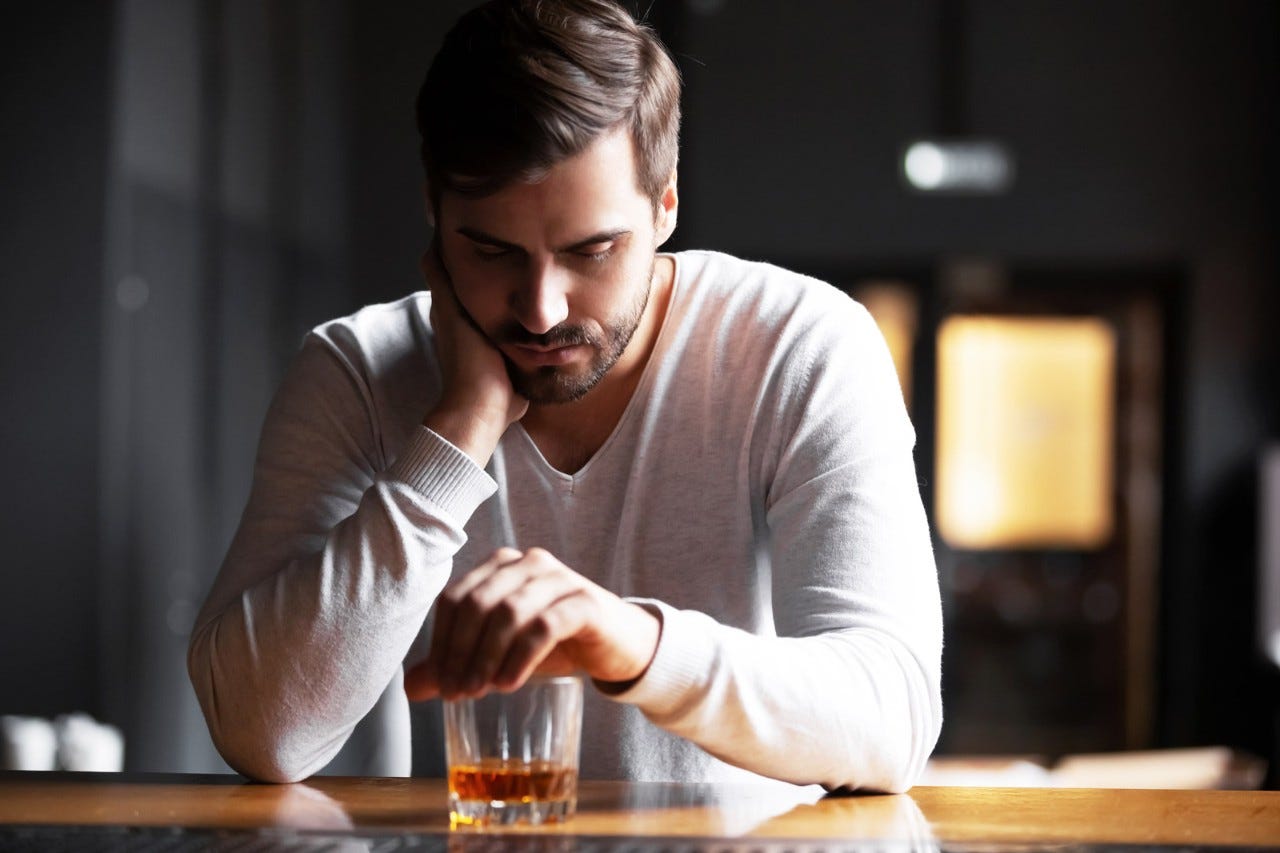Alcohol addiction: When is it too much?
Almost everyone drinks. But for some people, alcohol no longer has anything to do with pleasure. In Switzerland, around 250,000 people are alcohol dependent or at high risk of alcohol dependence.

We can always find a reason to drink, be it prosecco to make a toast, a beer while watching football, mulled wine at the Christmas market and a glass of wine to talk, enjoy and relax. For many people, alcohol is a part of everyday life, which is why it is considered socially acceptable despite the potential for addiction. Patrick Jola, head of communication/fundraising at Blaues Kreuz, says: “Drinking alcohol is deeply embedded in our culture, which makes it difficult for many people not to drink. For example, people give you a strange look if you turn down a glass of prosecco at a party.”
When is alcohol harmful?
How much alcohol is too much? We asked Arlette Reinmann Rudolf, psychotherapist and head of counselling at Blaues Kreuz Zürich: “Women should drink no more than one standard glass (12 g) of pure alcohol a day, men no more than two standard glasses (24 g). Any more than that is considered a health risk.”
These upper limits have been defined by the Swiss Alcohol Commission on the basis of medical studies. This does not mean, however, that it is okay to drink one or two glasses of wine as part of your daily routine. You should have at least two alcohol-free days a week.
People often drink more than the recommended amount at parties. But even then, men shouldn’t drink more than five standard glasses and women more than four. “The brain gets used to alcohol and the good feeling that it triggers in the reward circuits,” explains Reinmann Rudolf. The problem with drinking alcohol regularly, she says, is that your body increasingly needs more to achieve the same effect. A dangerous precedence.
““People often give you a strange look if you turn down a glass of prosecco at a party.””
Am I addicted?
The lines are blurred. Alongside the classic case of severe alcoholism when a person is fully dependent on alcohol, there are many other problematic types of alcohol consumption. Some people may not drink at all during the week, but regularly binge drink at the weekends, blacking out and not being able to remember chunks of time, and embarrassing themelves. Signs and symptoms of an alcohol use disorder include:
- A strong desire to drink alcohol and not being able to limit how much alcohol is consumed
- Losing interest in hobbies
- Unable to stop drinking even though they know it is causing harm
Psychotherapist Reinmann Rudolf refers to the guiding principle of the Swiss Alcohol Commission: “High-risk consumption can be described as: too often, too much, at the wrong time.”
Anyone who is asked about their alcohol consumption should also take this seriously. Because: The hurdle to do this is high for outsiders, alcohol is actually well accepted. And you should ask yourself why you drink. If alcohol serves a function (e.g. I drink to calm my nerves or to round off the day), this is another indication that something isn’t right.
The way out of addiction: therapy and relapse
In the past, people who could not control their alcohol consumption were considered weak-willed. Today we know that alcohol addiction is a disease that accompanies those affected for the rest of their lives. “Addiction results from a combination of biological, psychological and social factors that all need to be addressed,” says Arlette Reinmann Rudolf. That’s where addiction counselling and therapy comes in. “As a rule for people who have been addicted to alcohol over several years, treatment involves withdrawal in an inpatient unit followed by therapy with outpatient after-care. Self-help groups also prove effective in helping people to stay sober.”
However, there is a high risk of relapse, with estimates and studies putting the figure at between 70% and 90%. “Recovery from addiction should be seen as a marathon rather than a sprint,” says Reinmann Rudolf. People who seek support tend to have a better chance of recovery.
““Any kind of alcohol can trigger a relapse. Even the one in schnapps pralines.”
Never again?
Can people who suffer from an alcohol use disorder have an occasional drink or eat a liqueur chocolate? Better not, For many people with an alcohol addiction, the smell of alcohol triggers memories of the addiction phase and triggers the addiction memory. Watch out: alcohol can even be found in cooked food. “Any kind of alcohol can trigger a relapse,” warns Arlette Reinmann Rudolf. There is no cure. “Many people in recovery from an alcohol use disorder would like to be able to drink in moderation. But this is very rare. If you relapse again and again when trying to drink in moderation, it’s worth taking a longer break from alcohol. Many people notice then that they feel better and opt for a life entirely without alcohol.”
Prevention: what helps?
Of course, it is better to raise awareness, educate, promote other activities and encourage good friendships before an addiction problem arises (see box), particularly at a young age when people experience alcohol for the first time. Rudolf says: “Effective prevention at a young age has proven successful.” It is also a good idea to limit access to alcohol and ensure it is not readily available. That’s why Blaues Kreuz regularly carries out test purchases to ensure that alcohol isn’t being sold to minors.
Sanitas Foundation: Committed to moderate alcohol consumption
“Addiction prevention is an important part of addressing the ever-present risk of alcohol,” says Andrea Gerfin, project manager at the Sanitas Foundation. “With alcohol it is particularly important that young people learn about moderation. They have to understand that alcohol is not an effective way of coping with difficulties.” The Foundation supports charitable projects in the area of health promotion and prevention that use new digital methods to reach people. Some examples in the area of alcohol prevention:
-
Dry January
A whole month without alcohol – easy! Or is it? If you want to find out, it’s a good idea to take part in Blaues Kreuz’s “Dry January” initiative. “Participants notice that they sleep better after two weeks,” says Patrick Jola. “They also have more energy.” It is also proven that giving up alcohol has a positive impact on blood pressure and our skin. Last but not least, your blood and liver values also improve. The initiative kicks off in mid-November with a range of activities.
-
EverFresh
Prevention for young people by young people in the gym: With EverFresh, a project run by the IdéeSport foundation, 13 to 17-year olds are given information by their peers on the topic of addiction prevention. They hold sporting events as an alternative to going out and drinking and smoking. “Current figures on the consumption of alcohol among young people in Switzerland aged 12 to 17 indicate that addictive substances remain a big problem. Above all at the weekend and when going out, young people are exposed to the temptation of addictive substances,” says Lia Hofstetter from IdéeSport.
-
Ready4life
A pocket coach: Lungenliga’s interactive coaching app with chatbot educates young people and helps them stay healthy. The app provides information on addictive substances and helps manage stress and resolve conflicts. The chatbots address the most urgent topics with users, such as alcohol consumption. They send messages to offer support and provide answers to questions such as: How much do we actually drink? How much is too much? How can I drink alcohol safely?
-
No Addiction Coach
The new app developed by Suchtfachstelle Zürich and Blaues Kreuz provides coaching by chatbots André or Nora to help improve self-management and offer support between appointments for people undergoing treatment for addiction. “Dropout rates are lower among clients who use the app regularly. The app had a positive impact on the course of treatment,” says Sabin Bührer from Suchtfachstelle Zürich. The app’s consumption diary has proved very popular. So far, the Coach can only be used with an access code, but in future individual app functions will also be available independently of a consultation process. Awarded: This year, the No Addiction Coach won the special digitalization award from the "Health Network 2025".


